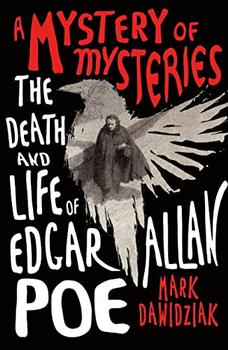Summary | Excerpt | Reviews | Beyond the Book | Readalikes | Genres & Themes | Author Bio

The Death and Life of Edgar Allan Poe
by Mark Dawidziak
Yet death is always there, a regular companion on Poe's trip to the grave in Baltimore. Death is always waiting for him, because, no matter where Poe happened to be in such a short span on this planet, he never was far from the end.
Things actually seemed to be looking up for Poe before fate and a steamer took him to Baltimore. While he was making plans to depart Richmond, he was holding on to many reasons for believing that the future would be a bit brighter. If not formally engaged to the love of his teen years, wealthy Richmond widow Elmira Royster Shelton, he certainly had reached an "understanding" with her. Poe's dream of having complete control of his own literary magazine also seemed within his grasp. One of the reasons he was traveling during the last months of his life was to raise money and solicit subscriptions for such a publication. Throughout his life, whenever he was at a point where some good fortune seemed imminent, things invariably fell apart because of bad luck, bad timing, or a self-destructive outburst. Without doubt, among his many other gifts, he had a positive genius for drinking or picking an ill-chosen fight at precisely the wrong moment. "There are so many instances where Poe is his own worst enemy," said Jeff Jerome, the former longtime curator of the Edgar Allan Poe House & Museum in Baltimore. "There are times when you just want to reach into the pages of the biography and slap him. You want to shake him and say, 'What are you thinking? What's the matter with you? Do you really think this was the right time to start arguing with this person who actually is going to help you?' You see this again and again with Poe."
Could he sense that the rug was about to be pulled out from under him one last time? Could he not stop himself from perversely pulling at the threads, contributing mightily to a final fall? There surely were many ill omens and troubling moments in the three months preceding his death. And there were the clear signs of the marked physical deterioration evident since the death of his beloved wife, Virginia, on January 30, 1847. The result of an undiagnosed illness, the drinking, years of battling poverty, the ravages of a grief that he described as taking him close to madness? He did not sound as if he suspected the end was so near when he took leave of his adoring mother-in-law and aunt Maria "Muddy" Clemm on June 29, 1849. They were still living in the modest Bronx cottage where Virginia died, and, although money was scarce, Poe hoped his journey would lead to an improvement in their fortunes. His destination was Richmond, the city where he had first made his name as a magazine editor and critic. Now he hoped his travels would yield financial support for a magazine of his own. Before he made it to Richmond, though, there would be a troubling stop in Philadelphia, another city where he had worked as an editor and critic. As Poe boarded a steamboat in New York that would take him to Perth Amboy, New Jersey, where he could make a train connection to Philadelphia, he told Muddy, "Do not fear for Eddy." He then assured her that he would "come back to love and comfort you." They were the last words she heard him speak.
Excerpted from A Mystery of Mysteries by Mark Dawidziak. Copyright © 2023 by Mark Dawidziak. Excerpted by permission of St. Martin's Press. All rights reserved. No part of this excerpt may be reproduced or reprinted without permission in writing from the publisher.
Your guide toexceptional books
BookBrowse seeks out and recommends the best in contemporary fiction and nonfiction—books that not only engage and entertain but also deepen our understanding of ourselves and the world around us.